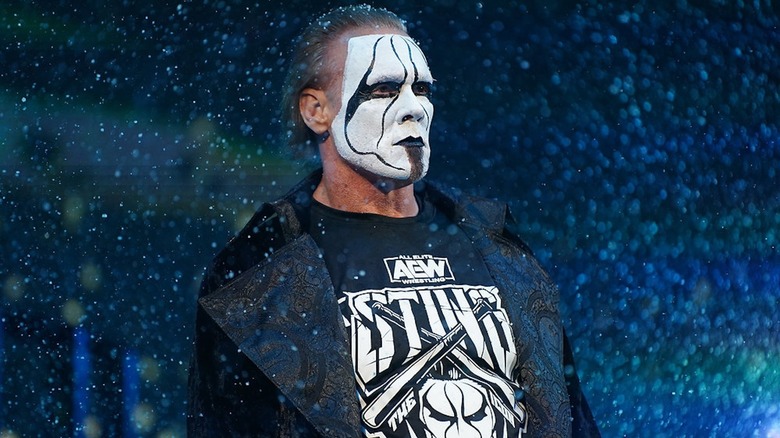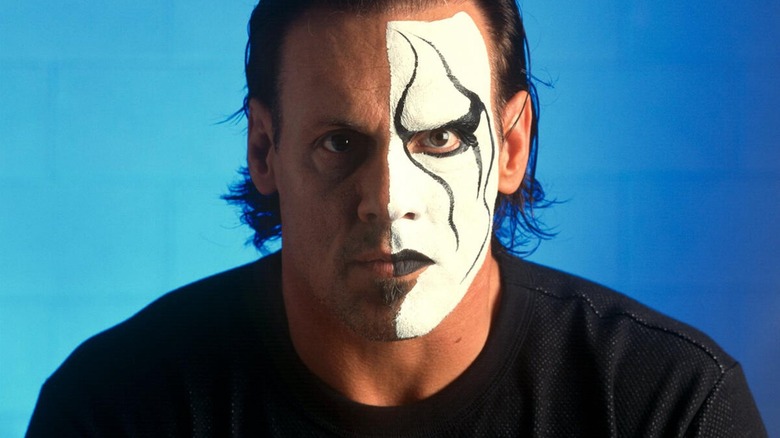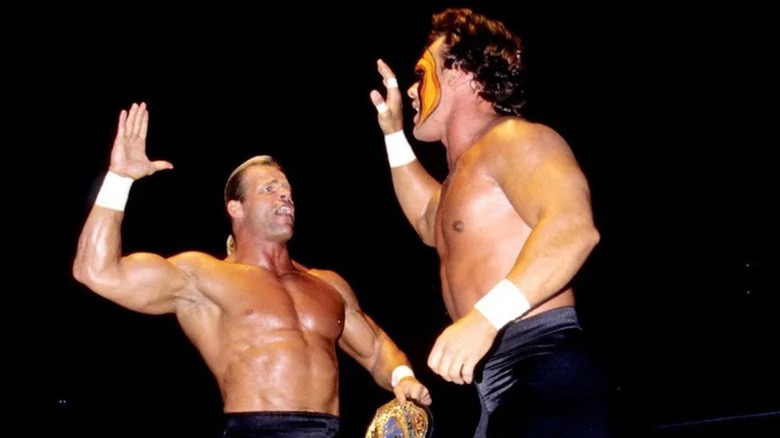Sting Explains What Has Kept Him Active In Wrestling For So Long
With a retirement match set for March 3 at "AEW Revolution," Sting will cap off a career that has spanned nearly 40 years, which is an impressive feat for any performer. However, what has kept "The Icon" ticking this long turns out to be no great secret at all. He turned away long ago from some of the vices his contemporaries sadly fell victim to. He's still operating with all his original equipment, meaning he's had no body parts replaced. He's also maintained a will to go out on his own terms, though that's meant having to do things differently these days. However, perhaps most importantly, he still wants to inspire others through faith.
When Sting wraps up his final match, teaming with Darby Allin to defend the AEW World Tag Team Championships against The Young Bucks at Revolution, it'll be the icing on the cake of a career that has spanned everywhere from the Continental Wrestling Association to UWF, Mid-South Wrestling, NWA, WCW, AJPW, NJPW, TNA, and his cup of coffee with WWE. His legacy is firmly in place, so how has he hung on so long? For one, he's been smart about what he allows himself to do, especially in this last run.
"It's like a potluck," Sting told D Magazine. "Picking and choosing on a daily basis what I'm able to do. I have all the original body parts." Granted, wrapping up his legendary career in 2024 was not his original intention. "I swore to myself, 'I'm never going to be one of those guys, and I'm one of those guys 10 times over." That said, his longevity can be chalked up to knowing when to clean up his act.
Sting knew when to clean up
The chronicles of substance abuse in wrestling have haunted just about every generation of the sport. However, while many wrestlers have only gone in a different life direction out of necessity, and far too many either never got clean or succumbed to their vices, Sting's path to longevity began when he started making changes in the prime of his career.
"I stopped doing steroids in 1990," he told The Ringer. "A lot of the guys just couldn't stop. They've all got new knees, new hips, shoulders reversed. I [still have] the same original body parts, thank God."
In addition to other long-term health effects, steroids have made a lot of wrestlers too bulky. This isn't sustainable for the long haul, as it takes a toll on the body, leading to joint problems and other mobility issues Sting alluded to. After witnessing these changes happen to some of his friends and peers, Sting took note, changed his ways, and lo and behold, he is wrestling in 2024.
"I was addicted to painkillers and drinking and steroids and drugs and a lifestyle for so many years," he added in the piece with The Ringer. "The human body can only take so much. A lot of the guys, especially in my era, they couldn't stop. I was on my way to being one of them, so I attribute the longevity to cleaning out the drugs and the alcohol, the overall lifestyle. Everything got cleaned up." That pivot was vital for Sting, but there has also been a guiding light that he believes has made more of a difference in his life and career than any other.
If you or anyone you know needs help with addiction issues, help is available. Visit the Substance Abuse and Mental Health Services Administration website or contact SAMHSA's National Helpline at 1-800-662-HELP (4357).
Sting's unrivaled faith
According to Sting WWE, he owes everything to discovering his faith, and the AEW star hasn't looked back since. "My life changed drastically in August of 1998 when I gave myself [and] my life to Jesus Christ," he explained to The Ringer. "I attribute, really, most of anything good [to that], and my longevity is one of the things that's good."
However, it wasn't enough to journey down that path on his own, as Sting also inspired others to live similarly. Appearing on the "Under the Ring" podcast, Lex Luger, to whom Sting was both a partner and a rival in WCW, looked at their similar evolutions. Luger credits Sting with being loyal to him and helping him through his darkest times.
"We're both followers of Jesus now," Luger said. "He never gave up on me, even during the worst times of my life. People thought I was going to be the next wrestler found dead. Stinger never gave up on me, and we're the best of friends to this day — he's a special guy and a special friend."
Never giving up on his friends in need is commendable, but to get to the situation he's in now, going out on his own terms at Revolution, Sting needed to not give up on himself either. In his final match with WWE, at Night of Champions in 2015, he injured his neck after taking a Buckle Bomb from Seth Rollins. It took nearly six years for Sting to return to action, in 2021 for AEW. With the end of his career now in sight, he told Sports Illustrated that he's surprised by what he's been capable of these past few years, and he credits Tony Khan for coaxing him out of retirement.


